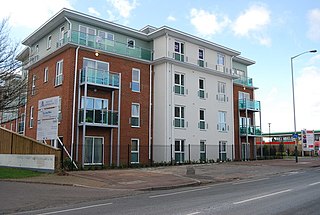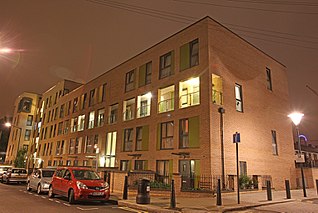Related Research Articles

The Greater London Authority (GLA), colloquially known by the metonym City Hall, is the devolved regional governance body of Greater London, England. It consists of two political branches: an executive Mayor and the 25-member London Assembly, which serves as a means of checks and balances on the Mayor. Since May 2016, both branches have been under the control of the London Labour Party. The authority was established in 2000, following a local referendum, and derives most of its powers from the Greater London Authority Act 1999 and the Greater London Authority Act 2007.
The Housing Corporation was the non-departmental public body that funded new affordable housing and regulated housing associations in England. It was established by the Housing Act 1964. On 1 December 2008, its functions were transferred to two new organisations, the Homes and Communities Agency and the Tenant Services Authority. The Corporation was formally dissolved on 1 April 2009.

In Ireland and the United Kingdom, housing associations are private, non-profit organisations that provide low-cost "social housing" for people in need of a home. Any budget surplus is used to maintain existing housing and to help finance new homes and it cannot be used for personal benefit of directors or shareholders. Although independent, they are regulated by the state and commonly receive public funding. They are now the United Kingdom's major providers of new housing for rent, while many also run shared ownership schemes to help those who cannot afford to buy a home outright.
Section 8 of the Housing Act of 1937, commonly known as Section 8, provides rental housing assistance to low-income households in the United States by paying private landlords on behalf of these tenants. Approximately 68% of this assistance benefits seniors, children, and individuals with disabilities. The Department of Housing and Urban Development (HUD) oversees Section 8 programs, which are administered locally by public housing agencies (PHAs).

Poplar HARCA is a housing association in London, England. It is the landlord of about 9,000 homes in the East London area, a quarter of which have been sold leasehold; the remainder are let on assured tenancies at subsidised rent levels.
Communities Scotland was an executive agency of the Scottish Government from 2001 to 2008. The Agency was responsible for housing, homelessness, communities and regeneration throughout Scotland.
Under the provisions of the United Kingdom Housing Act 2004 every landlord or letting agent that takes a deposit for an assured shorthold tenancy in England and Wales must protect the deposit under an authorised tenancy deposit scheme. The regulations came into effect on 6 April 2007, and were amended by the Localism Act 2011 and the Deregulation Act 2015. Most recently the Tenant Fees Act 2019 provided further protections for tenants.
Consumer Affairs Victoria (CAV) is a government agency that protects and promotes the interests of consumers and is based in the Australian state of Victoria. It is responsible for reviewing and advising the Victorian Government on consumer legislation and industry codes; advising and educating consumers, tenants, traders and landlords on their rights, responsibilities and changes to the law; registering and licensing businesses and occupations; conciliating disputes between consumers and traders, tenants and landlords; and enforcing and ensuring compliance with consumer laws. It is a business unit of the Department of Justice and Community Safety.

The Landlord and Tenant Act 1985 is a UK act of Parliament on English land law. It sets minimum standards in tenants' rights against their landlords.
An emotional support animal (ESA) is an animal that provides support to individuals with a mental health or psychiatric disability. Emotional support animals are not required to be trained. Any animal that provides support, comfort, or aid, to an individual through companionship, unconditional positive regard, and affection may be regarded as an emotional support animal.

Anchor was England’s largest not-for-profit provider of housing, care and support to people over 55 years old up until November 2018 when Anchor merged with Hanover Housing Association to form Anchor Hanover Group, the largest provider of specialist housing and care for older people in England.

Homes England is the non-departmental public body that funds new affordable housing in England. It was founded on 1 January 2018 to replace the Homes and Communities Agency (HCA). HCA in turn was established by the Housing and Regeneration Act 2008 as one of the successor bodies to the Housing Corporation, and became operational on 1 December 2008.

The Localism Act 2011 is an Act of Parliament that changes the powers of local government in England. The aim of the act is to facilitate the devolution of decision-making powers from central government control to individuals and communities. The measures affected by the Act include an increase in the number of elected mayors, referendums and the "Local authority’s general power of competence" which states "A local authority has power to do anything that individuals generally may do".
The history of rent control in England and Wales is a part of English land law concerning the development of rent regulation in England and Wales. Controlling the prices that landlords could make their tenants pay formed the main element of rent regulation, and was in place from 1915 until its abolition by the Housing Act 1988.
In England and Wales, a section 21 notice, also known as a section 21 notice of possession or a section 21 eviction, is a notice under section 21 of the Housing Act 1988, that a landlord must give to their tenant to begin the process to take possession of a property let on an assured shorthold tenancy without providing a reason for wishing to take possession. The expiry of a section 21 notice does not bring a tenancy to its end. The tenancy would only be ended by a landlord obtaining an order for possession from a court, and then having that order executed by a County Court bailiff or High Court enforcement officer. Such an order for possession may not be made to take effect earlier than six months from the beginning of the first tenancy unless the tenancy is a demoted assured shorthold tenancy. If the court is satisfied that a landlord is entitled to possession, it must make an order for possession, for a date no later than 14 days after the making of the order unless exceptional hardship would be caused to the tenant in which case possession may be postponed to a date no later than six weeks after the making of the order. The court has no power to grant any adjournment or stay of execution from enforcement unless the tenant has a disability discrimination, public law or human rights defence, or the case is pending an appeal.
The Tenancy Deposit Schemes (Scotland) Regulations 2011 came into force on 7 March 2011. Every landlord or letting agent that receives a deposit in Scotland must register with their local authority and join a tenancy deposit scheme.
The Scottish Housing Regulator (SHR) is an independent Non-Ministerial Department, directly accountable to the Scottish Parliament. The body was established on 1 April 2011 under the Housing (Scotland) Act 2010. SHR is the successor to the previous Scottish Housing Regulator agency, which exercised Scottish Ministers' powers under the Housing (Scotland) Act 2001.
One Housing Group is a housing association based in London and the south east of the United Kingdom. They manage 16,000 homes and provide support to residents who needs special help, through their social care arm, One Support. As of 2015-16, they had an annual turnover of £255m and employed ~1800 staff.

Clarion Housing Group is the largest housing association in the United Kingdom with 125,000 properties across more than 170 local authorities. Clarion Provides a home to over 350,000 people.

The Social Housing (Regulation) Act 2023 is an act of the Parliament of the United Kingdom which introduced new measures to improve the standards, safety and operation of social housing. The bill was introduced in the House of Lords on 8 June 2022 and received royal assent on 20 July 2023.
References
- ↑ Framework document for the Office for Tenants and Social Landlords (the Tenant Services Authority) Archived 19 July 2011 at the Wayback Machine
- ↑ The Tenant Services Authority, Quick Guide at Inside Housing , 20 June 2008. Retrieved 2010-06-18
- 1 2 CIPFA, Housing Finance Manual, chapter 1. September 2009.
- 1 2 TSA makes final preparations for new era of social housing regulation Archived 29 February 2012 at the Wayback Machine , 24dash.com, 16 March 2010
- ↑ "Tenant Services Authority". Archived from the original on 14 April 2012. Retrieved 15 April 2012.
- ↑ "Every Tenant Matters: A Review of Social housing Regulation by Professor Martin Cave". CLG. Archived from the original on 30 July 2012. Retrieved 14 December 2010.
- ↑ "Next steps for new social housing watchdog". DCLG. 15 October 2007. Archived from the original on 31 October 2007. Retrieved 14 December 2010.
- ↑ Tenant Services Authority recruitment begins, AboutProperty.co.uk
- ↑ New agencies will face 'huge challenges', Inside Housing, 1 December 2008
- ↑ For tenants by tenants, says new TSA chief, Inside Housing, 4 July 2008
- ↑ TSA team plucked from outside the corporation. Inside Housing, 7 November 2008
- ↑ Our role Archived 13 February 2010 at the Wayback Machine on TSA website
- ↑ "TSA's corporate plan puts tenants first". press release. TSA. 26 January 2009. Archived from the original on 2 June 2011. Retrieved 14 December 2010.
- ↑ Shapps to scrap Tenant Services Authority Archived 23 June 2010 at the Wayback Machine , Inside Housing, 18 June 2010, and interview Archived 19 June 2010 at the Wayback Machine
- ↑ Document leak shows HCA is 'under review' Archived 30 September 2010 at the Wayback Machine , Inside Housing, 24 September 2010
- ↑ "Tenant Services Authority to be abolished". Press notice. 14 October 2010. Archived from the original on 9 December 2010. Retrieved 24 June 2011.
- ↑ "Localism Act 2011: Section 178", legislation.gov.uk , The National Archives, 15 November 2011, 2011 c. 20 (s. 178), retrieved 27 March 2024,
Part 1 amends the Housing and Regeneration Act 2008 (regulation of social housing) so as to—(a) abolish the Office for Tenants and Social Landlords ("the Office")...
- ↑ "The Localism Act 2011 (Commencement No. 4 and Transitional, Transitory and Saving Provisions) Order 2012: Article 6", legislation.gov.uk , The National Archives, 1 March 2012, SI 2012/628 (art. 6), retrieved 27 March 2024